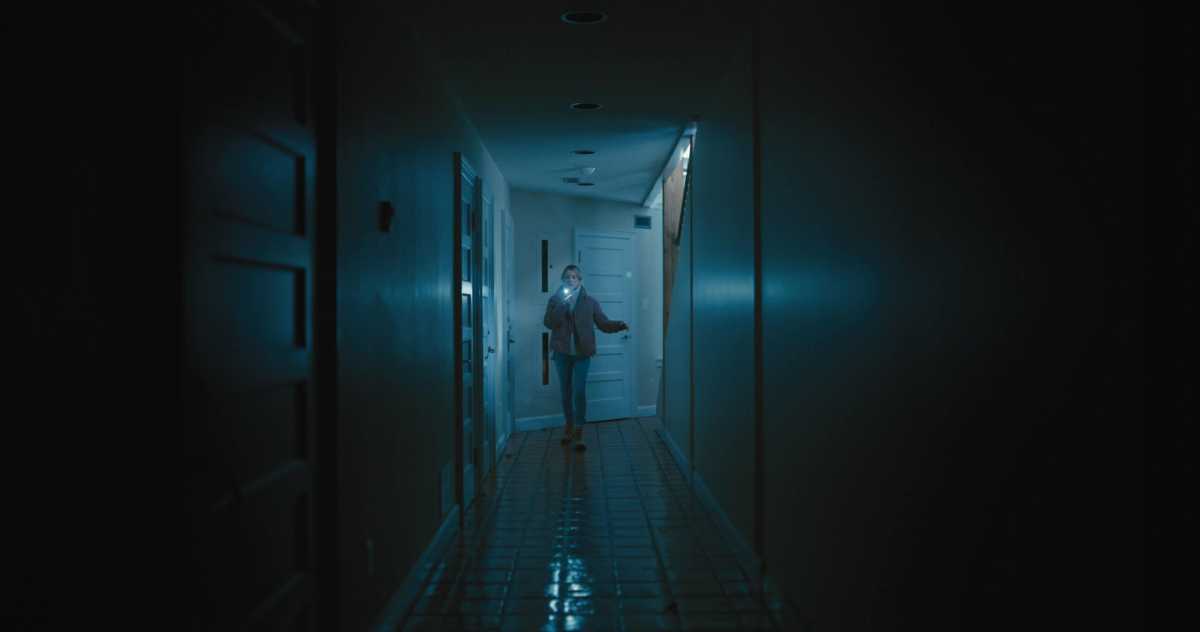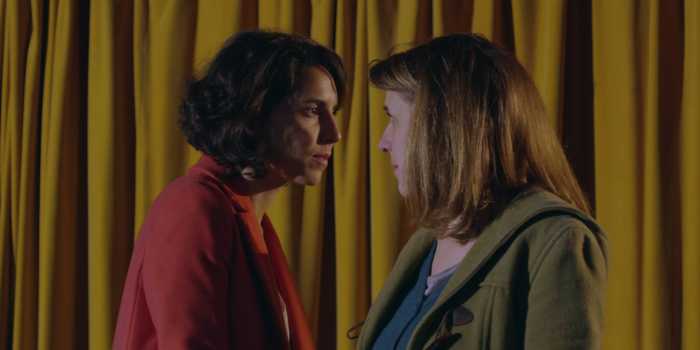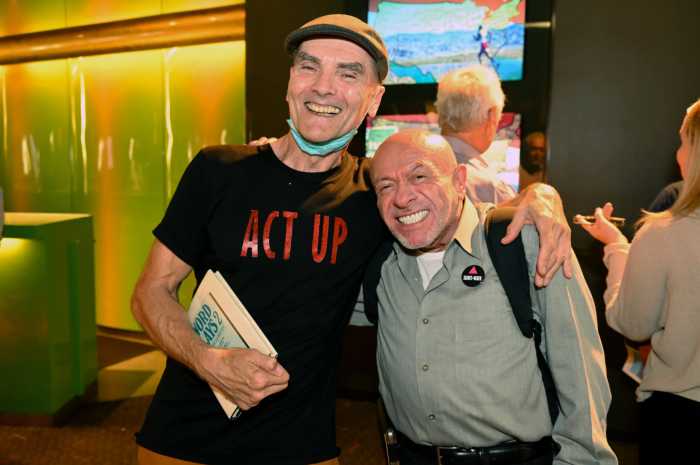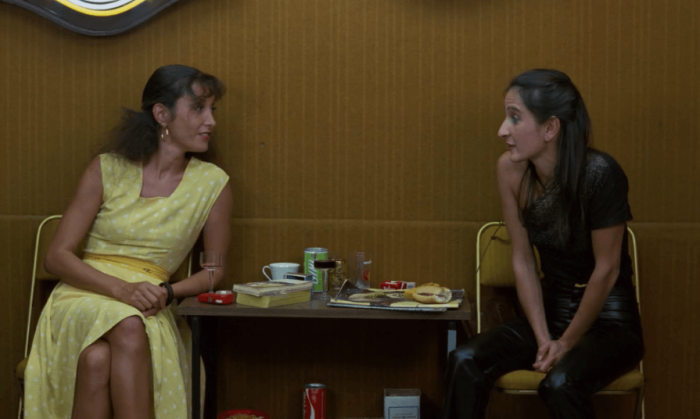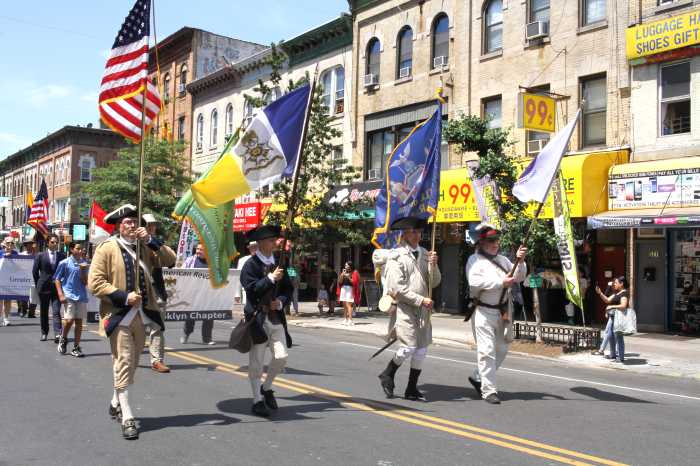“See for Me,” a nifty riff on “Wait Until Dark,” is a tense and suspenseful thriller about Sophie (Skyler Davenport), a blind ex-skier who takes a cat sitting job at a lavish, remote home belonging to Debra (Laura Vandervoort). When she gets locked out of the house, Sophie downloads the app “See for Me,” and connects with Kelly (Jessica Parker Kennedy) who acts as her eyes. Sophie relies on Kelly again when a trio of thieves break into the house hoping to steal $7 million hidden inside. But Sophie soon decides to help the crooks, not turn them in, in exchange for a portion of the cash, and before long, Sophie is fighting for her life (with Kelly’s help).
Davenport, who is legally blind and non-binary, impresses in their first on-screen leading role as the amoral Sophie. In a recent phone interview, Davenport, who has had an established career doing voiceovers for video games, chatted with Gay City News about making “See for Me.”
You work mostly in voice acting. This is your first on-screen leading role. Can you discuss your decision to make this film and what appealed to you about it?
I moved to Los Angeles to do on-camera work. It wasn’t an out-of-the-blue decision. I had an audition and had a callback, and a callback, and then got it. When I read the script initially, I loved that she kind of joins the [criminals] — I did not see that coming. I feel like people don’t think of an action thriller and assume that the lead would be disabled. I liked that, and that the filmmakers made her so human in her decisions. It was survivalist, which is what a lot of people would do — that was cool.
Sophie’s mother is both an advocate and an obstacle for her. Sophie reluctantly gets assistance from Kelly, and often has to place trust in others. How did you develop that element of her character? She fiercely wants to be independent but does need help.
One of the things about her when we did table read was that she went from being hardheaded to feeling that vulnerable side where she cracks and gives in to asking for help. In my personal experience, when I lost my eyesight, it was the opposite. I was reluctantly asking for help, but it didn’t come from a place of “Let me do this myself,” it came from a guilty place. I had lost my job, I had lost my relationship, I couldn’t drive all of a sudden. I had lost everything. It was more depressive guilt, whereas Sophie is trying to maintain the persona and life she had before vision loss. She wanted to think that nothing changed. It was fun to explore that because it was very different from what I went through. I love that because she was a skier prior to her vision loss. I like that she never really loses the drive and desire to go back to that [career]. She’s still focused on something she had before she lost her sight. A lot of people change or adjust certain dreams because something happens, and I don’t think it is always necessary.
Sophie is amoral, wanting to steal and resell expensive wine, and decides to help the burglars. I like that she wasn’t goody two shoes, or “inspirational,” but viewers do root for her. What did you think about her character?
It’s weird, it is, “I can’t quite hate you, but I’m not sure if I like you, either.” In the back of my mind, as she has those harsher moments, I tried to find something that will make people not necessarily like you, but at least empathize with you. You don’t want to be an angry Eeyore all the time, because that’s not interesting to watch. I went more with something people could understand and maybe empathize with, but not necessarily agree with. She is not bad; she is troubled.
Can you talk about shooting the “action” scenes, and handling the film’s gunplay?
They had to un-train me. I had to do extensive firearms training, which I had actually already had, and they were like, “We’re going to have make you not look like a professional police officer, because [Sophie] has never held a gun before.” Those scenes were super fun though, because you get to play around with action, but they are intense. A film gun is a little different than a real one. I did my original firearms training with actual rifles. Film guns have a little recoil, but a real gun has more kick to it. Some of it is acting, some of it is actual. It’s still dangerous.
You identify as non-binary, and I often find that folks are cast because of their identity. Did you encounter that with this role?
When they cast me in this, they had no idea how I identified. After I was cast, my manager gave them a heads up and they were amazing about it. It was the first time in my life when people made effort to acknowledge it. They didn’t know about [my being non-binary] because I didn’t say anything.
Do you hope to do more on-screen work, and even perform in a queer film in the future?
I would, absolutely! I did a short film, “The Shift” with Danny Trejo in 2020. They asked me, “You’ve had the top surgery, for female to male, and you don’t identify as male, but you’ve had the surgery. Would you be comfortable showing your scars for a second while you are changing and picking out clothes because the character you are playing is going to transition?” I said, “Yes! Thank you for asking!” I would never do a shirtless scene for a sexual purpose. But to show that, I was excited. I never thought I’d be excited about being shirtless on camera!
What are you looking to do next in your career?
I have some on-camera stuff that I am looking to be in, and I am working on about five different video games now. The voiceovers are pure fun. It’s still acting, because the games are getting more [complex]. I do voice and facial capture because the games are so real. I can play a 5-year-old or 10-foot tall alien.
“SEE FOR ME” | Directed by Randall Okita | Opening January 7 in Theaters, on Digital Platforms and VOD | Distributed by IFC Midnight

